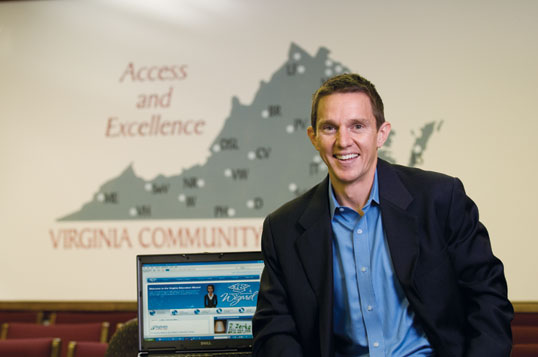Online College Planning - Virginia Community College System
- By Mary Grush, Matt Villano
- 07/28/09
At the 23-school Virginia Community College System, an old cliché has proven true: Sometimes the best ideas are conceived on the back of a napkin.
Back in 2006, Chancellor Glenn DuBois was discussing one-stop travel sites like Expedia.com over drinks with the CIO, and pondered why a similar planning tool couldn’t be created for navigating a path through postsecondary education and on to careers. DuBois soon secured federal funding to support the development of a tool dubbed the Virginia Education Wizard, and hired Craig Herndon, director of career and educational resources, to orchestrate the overall design.

Herndon began by conducting a needs analysis that identified a strong need among students for information and tools aimed at helping them pay for college, as well as a need among college faculty and advisers for resources to help students select and plan for careers. The analysis also noted that students needed help transferring from community college to four-year institutions, and lacked a one-stop web-based system for finding and applying to local community colleges throughout Virginia.
Programming for the Virginia Education Wizard was tackled by local software solution provider Chmura Economics & Analytics as well as Virginia Community College System internal information professionals Emilio Acevedo and Shinaya Seth. Guidance on the development of the Wizard’s functional content areas was provided by task groups comprised of content experts from across the state. And after extensive beta testing with students, faculty, and advisers throughout Virginia, the Wizard was completed in early 2009.
The Wizard brings together information to help students select careers based on personal interests; determine majors; compare costs of different higher education choices; apply to any of Virginia’s community colleges; and identify transfer pathways from two-year to four-year schools. Specifically, the tool links occupational information (i.e., user interests, local salary, local occupation demand) with specific information on related educational offerings of Virginia community colleges. Then it helps students map the required curricula to help them prepare for their desired career paths.
The site also helps students with financial concerns by comparing the cost of attending colleges and universities across the state, providing customized financial aid award estimates, and offering step-by-step instructions for completing the Free Application for Federal Student Aid (FAFSA).
The Wizard presents all of this information through a virtual assistant named Ginny, an avatar created with a product from interactive digital character vendor CodeBaby. Two separate avatars, Chris and Maria, host the FAFSA tutorial. Technologists say they opted to incorporate these virtual narrators to make the process even more user-friendly.
Monty Sullivan, VCCS’s vice chancellor for academic services and research, notes that to his knowledge, no tools on the market replicate what the Wizard offers for Virginia higher education students today. “It stands apart from college exploration tools provided in other states in that no other site provides the desired breadth and depth of dynamic information specific to the region or locality of the student,” he says.
Though the tool is still relatively new, early indicators signal a positive public response. Metrics show there have been more than 100,000 visits to the site since it launched in mid-March, and that the average user spends more than six minutes on the site and browses more than eight pages. The tool also has gained strong attention and praise from students, educators, and politicians all over Virginia.
Moving forward, officials hope to expand the Wizard beyond community colleges to become the statewide portal for career and college planning. The Virginia Community College System is in the process of partnering with the State Council of Higher Education for Virginia and the Virginia Department of Education, to develop new enhancements related to four-year schools and provide individualized college planning for students in grades seven through 12.
About the Authors
Mary Grush is Editor and Conference Program Director, Campus Technology.
Matt Villano is senior contributing editor of this publication.